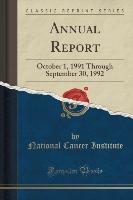- Start
- Annual Report
Annual Report
Angebote / Angebote:
Excerpt from Annual Report: October 1, 1991 Through September 30, 1992The Division of Cancer Biology, Diagnosis, and Centers supports laboratory and clinical investigations in cancer biology, immunology, and diagnosis. The Division is comprised of three research program areas. The Centers, Training and Resource Program consists of four branches: Cancer Centers, Construction, Organ Systems, and Research Training. The Extramural Research Program consists of three branches: Cancer Biology, Cancer Immunology. And Cancer Diagnosis.The Intramural Research Program consists of twelve laboratories and branches at the nih Bethesda campus and at the Frederick Cancer Research and Development Center. They are the Laboratory of Genetics, the Laboratory of Biochemistry, the Laboratory of Molecular Biology, the Laboratory of Cell Biology, the Laboratory of Cellular Oncology, the Laboratory of Immunobiology, the Laboratory of Mathematical Biology, the Laboratory of Pathology, the Dermatology Branch, the Metabolism Branch, the Experimental Immunology Branch, and the Laboratory of Tumor Immunology and Biology. Each of these laboratories is directed by a scientist of international stature, 3 of whom are members of the National Academy of Science and 3 of whom are members of the Institute of Medicine.Research conducted in the intramural laboratories covers a broad range of investigations from the regulation of gene expression in simple prokaryotic systems to clinical studies of human cancer. A common theme of many of these studies is to understand the molecular mechanisms involved in the regulation of normal cell growth and differentiation. The ultimate goal is to define the genetic changes responsible for neoplastic transformation, with special emphasis on understanding the genetic alterations associated with breast cancer. Recent advances in the identification of genetic markers associated with breast and other cancers are already providing useful in the diagnosis and prognosis of cancer. Considerable progress has been made during the past year in elucidating the molecular genetic mechanisms that result in tumor cell invasion, and in designing new agents that can interfere with the development of metastasis. One such agent, carboxyamido-imidazole (cai), has been identified that blocks signal transduction and interferes with tumor cell motility. Cai shows particular promise for the treatment of breast and ovarian cancer. It is currently being evaluated in a Phase I trial. Studies of basic tumor cell biology and advances in molecular genetic technology have led to the development of another new class of cancer therapeutic agents in which cell recognition molecules (such as monoclonal antibodies and growth factors) are fused to genetically modified forms of a bacterial toxin, or are chelated to radionuclides to produce molecules capable of binding to tumor cells and killing them. Clinical studies are in progress to evaluate the efficacy of these approaches in the diagnosis and treatment of selected tumors. Advances in our understanding of the molecular mechanisms responsible for the development of the multidrug resistant phenotype, and the development of techniques of gene insertion have suggested entirely newways of overcoming the problems of life-threatening bone marrow toxicity associated with high dose chemotherapy.About the PublisherForgotten Books publishes hundreds of thousands of rare and classic books. Find more at www.forgottenbooks.com
Folgt in ca. 5 Arbeitstagen
